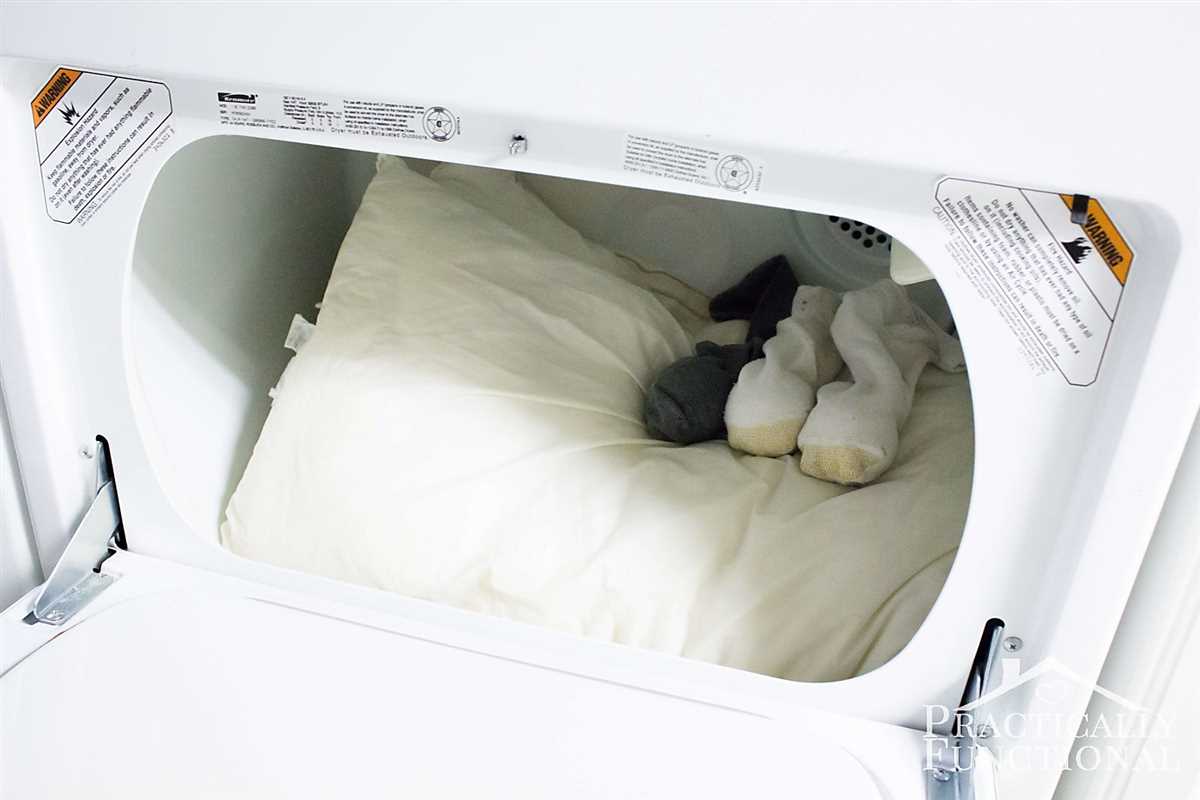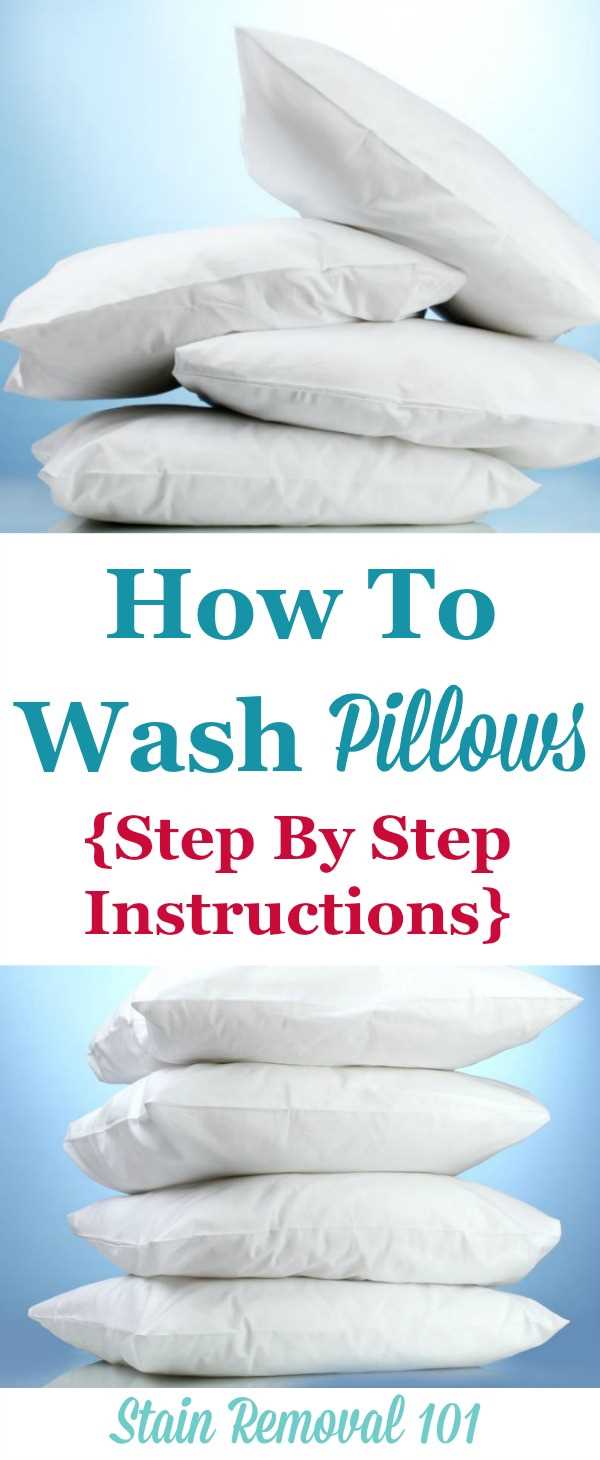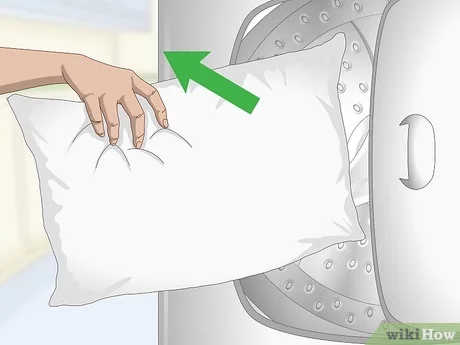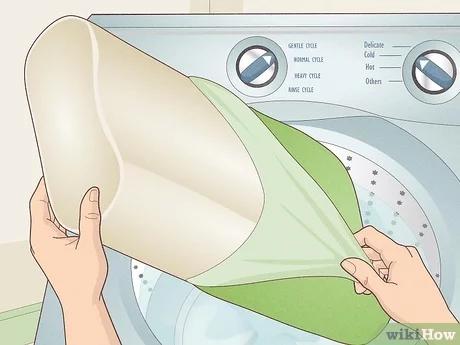




Drying pillows properly is essential to maintain their shape, comfort, and cleanliness. Whether you’ve just washed your pillows or they’ve gotten wet accidentally, it’s important to follow the right drying methods to avoid clumping, mildew, and other damage. In this article, we will discuss the best methods and tips to effectively dry your pillows.
1. Air Drying:
Air drying is one of the simplest and most effective ways to dry your pillows. Start by squeezing out any excess moisture from the pillows. Then, place them in a well-ventilated area, preferably outdoors or near a sunny window. Make sure to flip the pillows occasionally to ensure even drying. Depending on the weather conditions, air drying can take anywhere from a few hours to a couple of days. This method is suitable for most types of pillows, including foam, down, and synthetic fill.
TIP: If you’re drying foam pillows, avoid direct sunlight as it can cause them to deteriorate. Instead, place them in a shady area to dry.
2. Tumble Drying:
Tumble drying is another popular method for drying pillows quickly and efficiently. Start by placing the pillows in a dryer with a couple of clean tennis balls or dryer balls. The balls will help fluff up the pillows and prevent clumping. Set the dryer to a low heat setting and run it for a full cycle. To ensure even drying, stop the dryer occasionally and fluff the pillows by hand. Tumble drying is suitable for most types of pillows, but avoid using this method for foam or latex pillows as it may damage the material.
TIP: Add a few dry towels to the dryer to absorb excess moisture and speed up the drying process.
By following these methods and tips, you can effectively dry your pillows and keep them fresh, clean, and comfortable for a long time. Remember to always read and follow the care instructions provided by the manufacturer for your specific pillow type to avoid any potential damage.
Air Drying Pillows: The Natural Method
Air drying your pillows is a natural and effective method for removing moisture and ensuring they are thoroughly dry. Here are some helpful tips on how to air dry your pillows:
Step 1: Remove the filling
Before you can air dry your pillows, you’ll need to remove the filling. Check the care instructions on the pillow’s tag to see if it can be removed. If it’s possible, take out the filling and set it aside for later.
Step 2: Choose a well-ventilated area
Find a well-ventilated area in your home to air dry your pillows. It’s important to choose a spot near a window or a place with good airflow to allow the moisture to evaporate more quickly.
Step 3: Shake out the pillows
Take your pillows outside and vigorously shake them to remove any loose dirt, dust, or debris. This step will help ensure that your pillows are clean and ready to be air dried.
Step 4: Place pillows in the sun
Once you’ve shaken out the pillows, find a clean and flat surface where you can lay them out. Ideally, this should be in direct sunlight. Sunshine not only helps dry the pillows but also helps in killing any remaining bacteria or odors.
Step 5: Rotate and fluff
Rotate the pillows every hour or so to ensure all sides receive direct sunlight and proper airflow. Additionally, fluffing the pillows periodically will help speed up the drying process and prevent clumping.
Step 6: Check for dampness
After a few hours of air drying, check the pillows for any signs of dampness. If you notice any, continue the drying process until the pillows are completely dry. This may take a few days, depending on the thickness and material of the pillows.
Step 7: Reassemble the pillows
Once the pillows are completely dry, reassemble the filling if necessary and put it back into the pillowcases. Your pillows are now ready to be used!
Air drying your pillows is a natural and efficient way to remove moisture and maintain their shape and quality. By following these steps, you can ensure that your pillows are thoroughly dry and ready for a good night’s sleep.
Using a Dryer: Quick and Efficient
Drying pillows in a dryer is one of the quickest and most efficient methods. Here’s how you can do it:
Step 1: Preparation

Before you start, make sure to read the care label on your pillows. Some pillows may require specific drying instructions or may even be not suitable for machine drying. If the label allows machine drying, proceed to the next steps.
Step 2: Pre-Treatment
Before placing your pillows in the dryer, it’s a good idea to give them a pre-treatment. Remove any stains or spills by spot cleaning them with a mild detergent, or by following the care instructions on the label. This will ensure that your pillows come out fresh and clean after drying.
Step 3: Load the Dryer
When loading the dryer, make sure to balance the load. If you have multiple pillows to dry, add a few towels or a clean tennis ball to help fluff the pillows and prevent them from clumping together.
Step 4: Set the Dryer
Set the dryer to a low or medium heat setting, as high heat can damage the pillows. You can also add a dryer sheet to add a fresh scent to your pillows. Start the dryer and let it run for a full drying cycle.
Step 5: Check for Moisture
After the drying cycle is complete, remove the pillows from the dryer and check for any remaining moisture. If the pillows are still damp, you can either let them air dry for a while or run them through another drying cycle until they are completely dry.
Step 6: Fluff and Re-Shape

Once the pillows are fully dry, give them a good fluff and reshape them if necessary. This will help restore their original shape and ensure that they are comfortable to use.
Using a dryer to dry pillows is a quick and efficient method that can save you a lot of time and effort. Just make sure to follow the care instructions on the label and use a low to medium heat setting for best results.
Sun Drying: Harnessing the Power of the Sun
Sun drying pillows is an effective and eco-friendly method that harnesses the power of the sun to naturally remove moisture from your pillows. Not only does it help dry the pillows thoroughly, but it also helps to freshen them up.
Benefits of Sun Drying Pillows
- Natural and eco-friendly: Sun drying does not require any electricity or additional energy, making it an environmentally friendly option.
- Helps eliminate odors: The heat from the sun can help neutralize and eliminate any lingering odors in the pillows.
- Kills bacteria and dust mites: Sunlight has natural antibacterial properties and exposure to sunlight can help kill bacteria and dust mites that may be trapped in the pillows.
Steps to Sun Dry Pillows

- Choose a sunny spot: Find a suitable outdoor location where your pillows can be exposed to direct sunlight for several hours.
- Check the weather: Ensure that there is no chance of rain or high humidity that could hinder the drying process.
- Prep the pillows: Fluff the pillows to ensure even drying, and remove any pillowcases or covers if applicable.
- Place the pillows: Lay the pillows flat on a clean and dry surface. You can also use a clothesline or a clothes drying rack if available.
- Rotate and flip: Periodically rotate and flip the pillows to ensure that all sides are exposed to sunlight evenly.
- Monitor the pillows: Check the pillows regularly to see if they are drying properly. This process may take several hours or even a full day, depending on the weather conditions.
- Bring pillows indoors: Once the pillows are completely dry, bring them indoors and fluff them to restore their shape and softness.
Precautions and Tips

- Protect from direct sunlight: If your pillows have sensitive materials or vibrant colors, it’s advisable to cover them with a clean white sheet while sun drying to prevent any fading or damage.
- Check care labels: Make sure to read the care labels on your pillows to ensure they can be sun dried without any restrictions.
- Use a pillowcase: To keep your pillows clean during the sun drying process, you can place them inside a pillowcase to protect them from dirt or debris.
- Be mindful of pets: If you have pets, make sure to keep them away from the sun drying area to prevent any damage or unwanted fur on the pillows.
Sun drying pillows is not only an effective way to dry them, but it also helps to naturally freshen them up, kill bacteria, and eliminate odors. Give it a try and enjoy clean and fresh pillows using the power of the sun.
Tips for Drying Pillows Safely
Drying pillows properly is important to maintain their quality and prevent mold or mildew growth. Follow these tips to ensure safe and effective drying:
- Read the care instructions: Before drying your pillows, check the care instructions provided by the manufacturer. Different types of pillows may require different drying methods.
- Inspect for damage: Before placing your pillows in the dryer, inspect them for any damage or tears. If the pillow is damaged, it may not dry properly or it could cause further damage to the dryer.
- Use a low heat setting: Set your dryer to a low heat setting to avoid overheating the pillows. High heat can damage certain types of pillows, such as memory foam or down-filled pillows.
- Fluff the pillows: To ensure even drying, periodically remove the pillows from the dryer and fluff them. This helps to redistribute the filling and promote drying.
- Use dryer balls or tennis balls: Toss a few dryer balls or clean tennis balls into the dryer with the pillows. This will help to fluff the pillows and prevent them from clumping together during drying.
- Consider air-drying: If your pillows are not suitable for machine drying, consider air-drying them instead. Lay them flat on a clean surface or hang them outside to dry naturally.
- Be patient: Depending on the size and type of pillows, it may take several cycles to fully dry them. Avoid rushing the drying process to ensure the pillows are thoroughly dried.
- Check for moisture: After each drying cycle, check the pillows for any signs of moisture. If they are still damp, continue drying them until they are completely dry.
- Keep them clean: Regularly washing your pillows and keeping them clean can minimize the amount of time they need to spend in the dryer. This can help prolong their lifespan.
By following these tips, you can safely and effectively dry your pillows, keeping them fresh and comfortable for a good night’s sleep.
Note: Always follow the manufacturer’s instructions for drying your specific type of pillow.
Choosing the Right Drying Method for Different Materials
When it comes to drying pillows, different materials require specific methods to ensure they are dried properly. Here are some tips for drying common pillow materials:
1. Cotton Pillows
Cotton pillows are popular for their breathability and comfort. To dry cotton pillows, you can use the following method:
- Place the pillow in the dryer on a low heat or delicate cycle.
- Add a couple of dryer balls or tennis balls to fluff the pillow and promote even drying.
- Check the pillow regularly to avoid over-drying, as this can cause the cotton to shrink.
2. Feather Pillows
Feather pillows are known for their softness and luxury feel. When drying feather pillows, it’s important to take extra care to prevent damage:
- Place the feather pillow in the dryer on a low heat or delicate cycle.
- Consider adding a few clean, dry towels to help absorb moisture and prevent clumping.
- Fluff the pillow and rotate it regularly to ensure even drying and prevent feathers from clumping together.
- It may take longer for feather pillows to dry completely, so be patient and check regularly to avoid over-drying.
3. Synthetic Pillows
Synthetic pillows are often made of polyester or other synthetic fibers. They can be more durable and resistant to mold and dust mites. To dry synthetic pillows:
- Place the synthetic pillow in the dryer on a low to medium heat setting.
- Consider adding a couple of dryer balls or clean tennis balls to help fluff the pillow and prevent clumping.
- Check the pillow regularly to ensure it is drying evenly and avoid over-drying.
4. Memory Foam Pillows
Memory foam pillows are known for their supportive and contouring properties. However, drying them requires extra caution to prevent damage:
- Avoid using a washing machine or dryer for memory foam pillows, as they can easily lose their shape.
- Instead, air dry memory foam pillows by laying them flat on a clean, dry surface in a well-ventilated area.
- Rotate the pillow regularly to ensure all sides are drying evenly.
- Allow the pillow to dry completely before using it again.
Remember to always check the care instructions provided by the manufacturer before drying any pillow. Following these guidelines will help you choose the right drying method for different pillow materials and ensure their longevity.
FAQ
How often should I dry my pillows?
It is recommended to dry your pillows every 3-6 months to keep them fresh and clean.
What is the best method to dry pillows?
The best method to dry pillows depends on their material. For synthetic pillows, use low heat in the dryer. For down or feather pillows, air drying is preferable. Always check the care label for specific instructions.
Can I dry my pillows outside?
Yes, you can dry your pillows outside as long as the weather permits. However, be mindful of direct sunlight, as it may fade or damage the pillow’s material.
How can I make my pillows dry faster?
To make your pillows dry faster, you can add clean tennis balls or dryer balls to the dryer. The balls will help fluff the pillows and increase airflow, reducing drying time.
What should I do if my pillows are still damp after drying?
If your pillows are still damp after drying, you can put them back in the dryer for a longer cycle or hang them in a well-ventilated area to air dry completely.
What is the best method for drying pillows?
The best method for drying pillows is to air dry them outside in the sun. This allows for natural ventilation and helps in preventing any unpleasant odours. If you don’t have access to outside space, you can also use a low-heat setting on your dryer.











